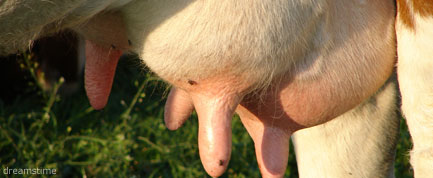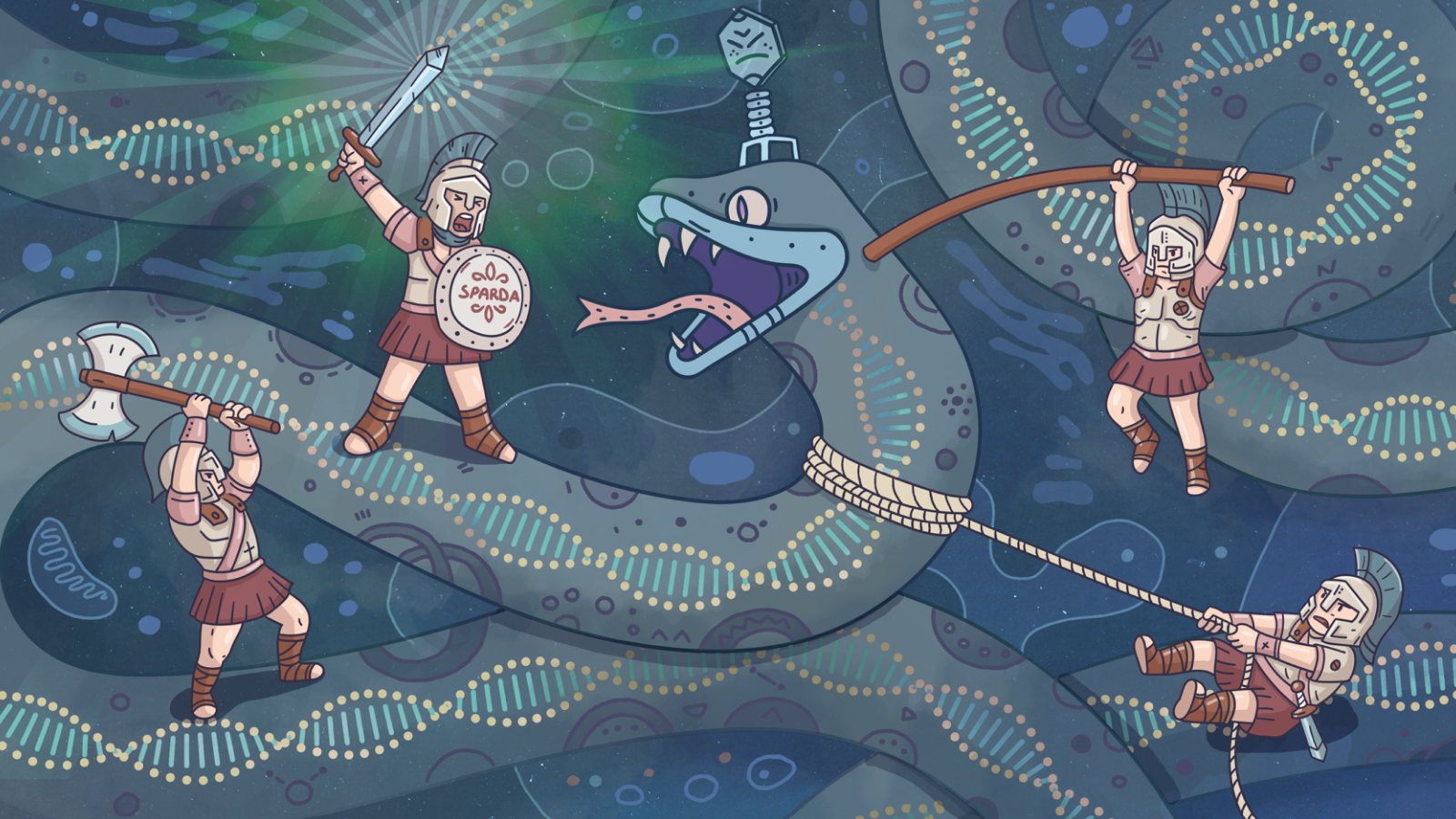Cloned Milk and Meat: What's the Beef?

Milk and meat from cloned cows could hit grocery shelves in a few years if the FDA approves the process soon, as is expected.
But would the products be safe? Scientists and consumer advocates disagree on the answer.
The Food and Drug Administration has been wrestling for more than five years with the question of whether or not to allow the use of milk or meat from cloned cows, swine and sheep, with a voluntary ban on such products in place for now. Cloning companies and many scientists say the products are safe to eat, while consumer advocacy groups argue there are unaddressed concerns.
Several researchers told LiveScience that the FDA approval is inevitable. The Wall Street Journal reported last week that it could come as soon as this week.
But milk and meat from cloned animals is unlikely to hit grocery store shelves for a few years. Clones must grow up before products from them can be used. And since creating them is expensive, they will likely be used for breeding, not for direct consumption, experts say.
Cloning concerns
Reports of abnormalities, higher disease susceptibility and early deaths of clones have prompted many of the concerns about using their milk and meat. (Dolly, the sheep that was the first animal cloned by this process, was euthanized at the early age of six, though scientists at the institute that created her stated the disease she was suffering from was unrelated to her being a clone.)
Get the world’s most fascinating discoveries delivered straight to your inbox.
Some of these abnormalities result from slight changes that occur when the DNA from the cow to be cloned is being read and translated by the egg cell from another cow into which it is implanted — even if clones are genetic replicas, they aren't quite identical to the original donor. These so-called epigenetic changes allow us to tell human identical twins apart, said geneticist Bill Muir of Purdue University, an author of a 2002 National Academy of Sciences report on the scientific concerns of animal biotechnology.
Abnormalities can result in prenatal deaths and deaths early on after birth, but TransOva Genetics President David Faber says that this is true of all artificial breeding processes, including artificial insemination and in vitro fertilization. Clones that do make it to adulthood seem to be no different than their peers, Muir told LiveScience this week.
"Generally the animals that have survived have been perfectly normal," said biochemist R. Michael Roberts of the University of Missouri, also an author of the 2002 NAS study.
Some consumer advocacy groups, such as the Center for Food Safety, remain skeptical. CFS spokesman Jaydee Hanson acknowledges that some clones do reach adulthood without abnormalities, but contends that cloning is still an uncertain science with potentially unknown effects.
"We're not saying that every clone comes out wrong, but enough of them do" that more stringent requirements should be used and more testing done, he said.
Effects?
One big question on the minds of groups like Hanson's is how these abnormalities would affect the composition of milk and meat, whether it could change the nutritional value or introduce some harmful component.
Muir says that the companies that do cloning have conducted chemical tests, which they submit to the FDA, that show that the proteins, fat and other components in the milk of cloned animals appear to be the same as in normal milk.
"The milk was ordinary milk," Roberts agreed.
Muir acknowledges that the cloning process could cause different genes to be turned on , which could cause unknown substances to be expressed in the clones. The substances could escape detection because scientists don't know what to look for.
But, he points out, "there doesn't seem to be anything harmful."
Hanson, the Center for Food Safety spokesman, says that though studies have found nothing wrong with the cloned animal products, that doesn't mean they should be fed to humans.
"We shouldn’t see what the effects are by going ahead and feeding them to humans just in case there aren't any," he said.
Consumer advocates don't think the FDA testing has been rigorous enough.
"The FDA's done a poor job with the risk assessment," Hanson said. He called the FDA's work "a weak risk assessment with people with a vested interest from the industry side" participating.
Muir, Roberts and Faber contend that the studies that have been done are more than adequate to assure the safety of products from cloned animals.
Inbreeding problem
The main concern that scientists actually had in the 2002 NAS report, according to Muir, was not the effect of cloned products on humans, but the health of the animals themselves.
Young animals were of particular concern because their immune systems tended to be more stressed, and there was more risk of them shedding pathogens if they were used for meat (in veal, for example). But studies and advances in the last five years have answered many of these concerns, Muir said.
Some worry that cloning would create a "monoculture" that is susceptible to diseases because it has no genetic variation (as is the case with some genetically modified crops). But as Muir points out, sombe breeds of American dairy cows today are so inbred that "we already have that problem, and cloning is not going to make it worse."
Some lines of dairy cows are bred from just a few bulls and are selected for their high milk production. Such a high level of inbreeding in these normal cows means they have weak immune systems and so they are fed antibiotics (which many consumer groups also object to) because they have such high rates of infection.
According to Roberts, of all the genetic methods that the NAS risk assessment examined, "we felt the least risk was actually from cloned animals."
What to expect
Concerns aside, it seems likely that the FDA's approval is imminent and inevitable.
Would an FDA approval this week mean that meat and milk from cloned cows would be on the shelves tomorrow? Probably not, most experts say.
The first product to enter the market would be cow's milk. Already, some 500 cloned dairy cows are ready to produce milk, Muir says.
But its not clear when any of the milk would become available. Many milk producers, such as Dean Foods Co., have said they won't use milk from cloned cows, largely because of consumer backlash.
Meat deriving from cloned cows would take longer to make it to market, and because the clones would likely be used as breeders and not butchered for their meat (since they would cost up to $20,000 a pop), "it's unlikely that most consumers would eat a clone directly," Faber said.
Consumers would likely eat the offspring of breeding clones, because breeders aren't interested in clones for their milk or meat, but for their genes, Faber said.
Cloning: an insurance program
For farmers, cloning is a way to preserve the genes of their best animals, Muir said. A farmer may breed a bull with several of his cows, but won't know how well the offspring will perform until they are grown, at which point the bull may be gone.
In this way, cloning acts as an "insurance program" for breeders, Muir says, allowing them to preserve the genes of cows and bulls to create a clone for later breeding.
"You're putting him on ice and saving him for later," Muir said.
Some meat companies have echoed dairy producers in saying they would not use cloned meat, Hanson said, because of consumer concerns.
Roberts says that labeling cloned milk or meat so that consumers could avoid it is unlikely — the FDA has not mentioned it in any of their draft assessments. He says the task would be almost impossible, since the milk that you pour into your cereal isn't just from one cow. And while he thinks the public has a right to know where its food comes from, "we know that this milk and these meats are perfectly safe," he said.
Why concerns persist despite studies that deem cloned milk and meat safe to consume is something that Muir, Roberts and Faber chalk up to fear of change and the novelty of the cloning process and its implications for humans. Faber says there was similar resistance to using artificial insemination to breed animals and even to pasteurizing milk.
Cloned livestock "should have been approved years ago," Roberts said. "It isn't the science that's held things up. It's the reaction of the public."
Muir thinks people are made uncomfortable because of the slippery slope from animal cloning to human cloning and therefore think that "we're coming closer to playing God," he said.
- Video: Cloned Beef Safety
- Vote: Freakiest Lab Animals
- Cloning: How it Works

Andrea Thompson is an associate editor at Scientific American, where she covers sustainability, energy and the environment. Prior to that, she was a senior writer covering climate science at Climate Central and a reporter and editor at Live Science, where she primarily covered Earth science and the environment. She holds a graduate degree in science health and environmental reporting from New York University, as well as a bachelor of science and and masters of science in atmospheric chemistry from the Georgia Institute of Technology.
 Live Science Plus
Live Science Plus





